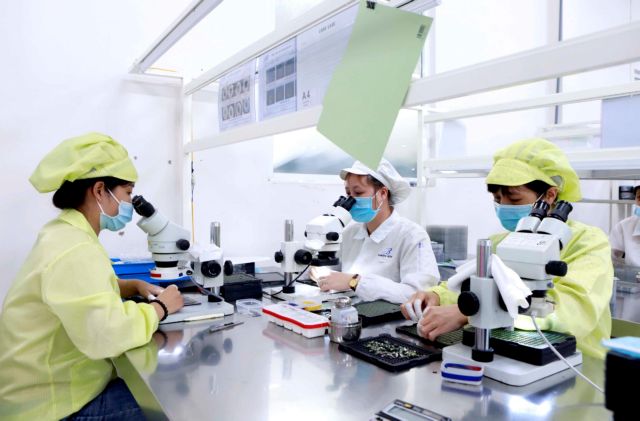 Economy
Economy

 |
| Electronic components are produced for export at Youngbag Vietnam Co in Vĩnh Phúc Province. — VNA/VNS Photo Hoàng Hùng |
HÀ NỘI — Despite electronics being a vital driving force behind Việt Nam's exports, many Vietnamese producers are still not up to the mark for supplying components to global heavyweights.
Đỗ Thị Thúy Hương, a member of the executive committee of the Vietnam Electronic Industries Association (VEIA), said Vietnamese electronics producers were withstanding the global economic downturn quite well with a six-month trade surplus of US$20 billion.
However, many of them stayed on the sidelines when global heavyweights moved their facilities to Việt Nam and outsourced their production. They failed to tick all the boxes that are essential to becoming their vendors.
"Few Vietnamese producers have made it to Apple's supply chain, despite its relocation of production facilities to the country," said Hương.
And that is where Chinese and Taiwanese suppliers come into play. Those suppliers moved in and poached employees away from local suppliers, feeding the vicious circle of their retreat from global supply chains.
But qualification is only part of the story. In fact, many global heavyweights didn't employ local producers as vendors because they found no motivation to do so. Local outsourcing requires a change in support policy that they have always been seeking to avoid.
Amid the global economic downturn, failure to become a link in the global supply chain has proven fatal to local producers. Scores of them have eased their operations because they could pay their employees no longer.
The committee member suggested a solution to the problem, which involves a regulation that requires global heavyweights to employ a certain number of local producers as vendors when they are doing business in Việt Nam.
"It should be made mandatory for global heavyweights to employ between 30 to 100 local vendors in around two years," she added.
Samsung has been around in this regard for years. By December 2022, its supply chain in Việt Nam has 207 local vendors, with 51 being tier-1. The figure has been the result of its six-year effort to support and train local producers to get up to standards.
A storm is looming on the horizon. VIEA members said they had received no new orders from their traditional markets such as the US, China, European Union and South Korea by June. The situation was not much better in other markets, such as Canada, from which orders were few and volatile.
Hương suggested the use of diplomatic measures to ensure access to more orders from abroad, thereby lifting local producers out of their hardship. "Order diplomacy", a term coined by Hương to describe the concept, must be top of mind when Vietnamese delegations visit another country.
In his visit to the US in April 2022, Prime Minister Phạm Minh Chính used diplomatic measures to request tech giants to develop their supply chains in Việt Nam and engage local producers as their suppliers.
"Order diplomacy", therefore, could be done in a similar manner to help electronics producers gain the favour of global heavyweights, she said. VNS




